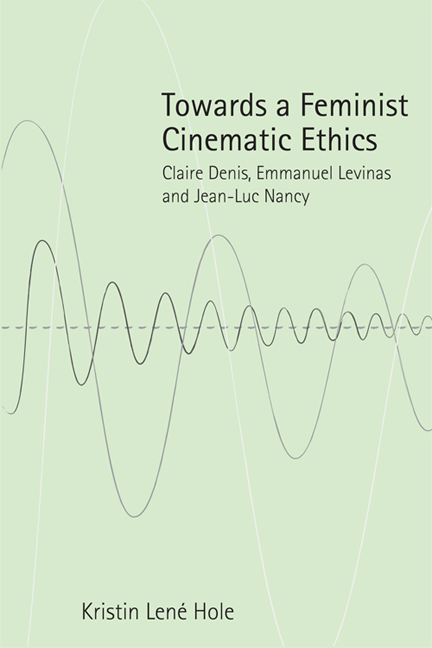Book contents
- Frontmatter
- Contents
- List of Figures
- Acknowledgements
- 1 Encounters, Intrusions: Denis, Levinas, Nancy
- 2 Film Interrupted: Denis, Nancy and an Ethics of Sense
- 3 Otherwise than Hollywood: Denis, Levinas and an Aesthetic of Alterity
- 4 Troubling the Body: Trouble Every Day, Dance and the Non-Mythic Body
- Coda
- Bibliography
- Index
3 - Otherwise than Hollywood: Denis, Levinas and an Aesthetic of Alterity
- Frontmatter
- Contents
- List of Figures
- Acknowledgements
- 1 Encounters, Intrusions: Denis, Levinas, Nancy
- 2 Film Interrupted: Denis, Nancy and an Ethics of Sense
- 3 Otherwise than Hollywood: Denis, Levinas and an Aesthetic of Alterity
- 4 Troubling the Body: Trouble Every Day, Dance and the Non-Mythic Body
- Coda
- Bibliography
- Index
Summary
My way of making films is tied to desire … Not just the physical desire for another person but desire in general. All my films function as a movement toward an unknown other and toward the unknown in relations between people.
Claire DenisCan we speak of an ethical responsibility towards the memory of a serial killer? What if the killer in question is gay, a black West Indian immigrant, and an HIV-positive drug user? All of these rubrics applied to Thierry Paulin, the so-called granny killer, who confessed to killing twenty-one elderly women in Paris between 1984 and 1987. Controversially, Claire Denis chose to take up this story in her third feature film, J'ai pas sommeil (I Can't Sleep). Rather than sensationalising her subject matter as a portrait of absolute evil or monstrosity, she explores the ambiguity of human violence through a multiplot structure and an understated representation of the crimes. Denis has said in interviews that Paulin was described as a sweet and nice person by those who knew him and that she was drawn to the reality of his multiple roles as brother, son and many other things alongside his role as a violent killer. I read her unique approach to her subject matter as ethical when viewed through a Levinasian lens, arguing that his philosophy offers fruitful possibilities for the articulation of a feminist filmmaking practice.
Denis's representational practice is one centred in alterity and ambiguity. The ambiguity present on multiple levels of I Can't Sleep is a strategy that evokes what Levinas would term the absolute alterity of the other. Unlike classical narrative cinema, the film refuses character psychologisation, leaving characters unknowable and opaque. I read I Can't Sleep's performance of failure – in the sense of failing to capture the other – as part of this ethical approach. I examine how Denis constructs her narrative to reveal a fundamental being-with that resonates with Levinas's concept of the subject as constituted relationally via a call to ethical responsibility to the other.
- Type
- Chapter
- Information
- Towards a Feminist Cinematic EthicsClaire Denis, Emmanuel Levinas and Jean-Luc Nancy, pp. 86 - 116Publisher: Edinburgh University PressPrint publication year: 2015



